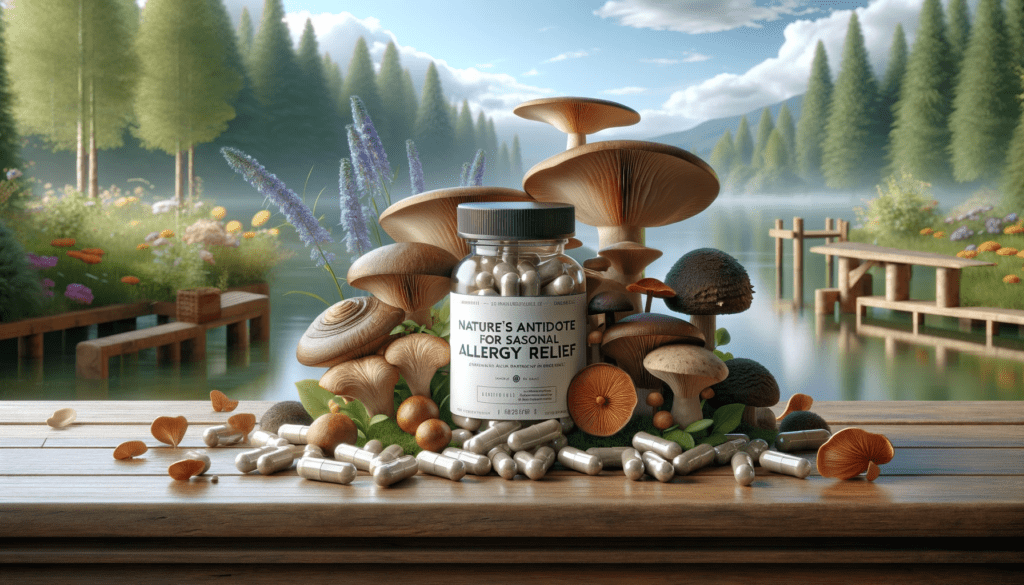For millions suffering from seasonal allergic rhinitis, springtime brings aggravation rather than rejuvenation. As trees burst into bloom and pollen floats on the breeze, runny noses, congestion, and itchy eyes turn the mild weather miserable. Allergy medications only go so far without addressing root causes. Might functional mushrooms provide nature’s antidote?
Certain mushroom varieties demonstrate anti-inflammatory and immunomodulating capabilities relevant to allergies. Compounds like polysaccharides and plant sterols may reduce overzealous histamine reactions by regulating immune pathways. This article explores allergy basics, mushroom mechanisms of action, and research on varieties believed to counter seasonal sensitivity.
Understanding Allergic Rhinitis

Before examining mushroom solutions, let’s review key allergy concepts. Seasonal allergic rhinitis involves an overactive immune response upon encountering benign environmental substances like pollen or pet dander.
Specialized white blood cells produce immunoglobulin E (IgE) antibodies that bind to allergens. This triggers the release of inflammatory chemicals like histamine which lead to bothersome localized symptoms. For sufferers, allergen exposure initiates a bothersome cascade of sneezing, congestion, mucus production, and itchy nose and eyes.
Allergy testing helps identify which substances provoke sensitivity for a given individual. Options include skin prick testing, blood tests measuring allergen-specific IgE levels, and elimination diets. Once confirmed, strict avoidance prevents allergic reactions although not always realistic for ubiquitous triggers like pollen.
Many turn to daily medications for relief. Antihistamines like Claritin alleviate symptoms but ideally long-term due to side effects. Cortisone nasal sprays resolve inflammation yet possible rebound reactions develop with overuse. Allergy shots help gradually desensitize over time through controlled exposure. But easier, lasting solutions remain elusive for most.
This is where mushrooms come in. Rather than temporarily quell symptoms, compounds naturally present in certain fungi may address the root sensitivity behind seasonal allergies. Let’s explore key mechanisms and specific mushroom varieties believed to ease seasonal allergic rhinitis.
How Mushrooms Impact Allergies and Immunity
Research confirms various species demonstrate anti-allergy and antihistamine activity. Mushrooms like reishi, cordyceps, Agaricus, and lion’s mane contain unique polysaccharides and plant sterols that beneficially interact with immune pathways underlying allergies. These compounds regulate over-responding elements of allergic reactions to prevent symptoms from developing.
Beta-glucans comprise the best-studied allergy-relevant mushroom polysaccharides. As complex sugars are naturally present in cell walls, they exert broad immunomodulating properties. Specifically, beta-glucans balance the TH1 and TH2 pathways of adaptive immunity. TH2 over-activation leads to the overproduction of IgE antibodies and related allergic responses.
Reishi and cordyceps contain notable beta-glucan fractions that curb TH2 dominance as shown in rodent allergy models. Lion’s mane and other edible mushrooms also supply immunoregulating beta-glucans but require further allergy-specific research.
Additionally, various mushroom sterols and terpenoids demonstrate direct antihistamine effects. These natural steroid-like compounds block histamine release from mast cells that drive allergy symptoms. Certain volatile mushroom terpenes also suppress histamine action.
Both immunomodulating polysaccharides and anti-inflammatory terpenoids play a multi-target role in regulating immunity underlying allergic reactions. Mushroom fruiting bodies, cultured mycelium, and extracted fractions all provide sources of these bioactive ingredients.
Mushroom Supplements: Nature’s Antidote for Seasonal Allergy Relief

Both anecdotal reports and emerging clinical trials support certain mushroom supplements easing seasonal allergy misery. Varieties with noted antihistamine and anti-inflammatory qualities represent top options for tackling allergy symptoms and sensitivity at the roots. Let’s review a few science-backed selections:
Reishi
This medicinal mushroom stalwart demonstrates diverse immunomodulating properties that curb allergy reactions. Used traditionally as an antihistamine and featured prominently in allergy research, reishi mushroom balances TH1 and TH2 pathways for lasting symptom relief.
Cordyceps
Valued by Chinese healers as a lung tonic, the caterpillar fungus cordyceps shines for respiratory allergy support. Anti-inflammatory compounds suppress allergen-induced airway hypersensitivity as shown in asthma models. For seasonal allergy relief and prevention, cordyceps cuts to the quick.
Lion’s Mane
Edible lion’s mane mushroom contains bioactive polysaccharides that mitigate allergy hypersensitivity reactions. It also enhances T-regulatory cell activity which suppresses excessive immune responses. Early trials confirm lion’s mane oral tolerability alongside anti-allergy effects.
Agaricus blazei
Studies focused on medicinal Agaricus mushrooms demonstrate anti-allergic benefits for conditions like asthma, dermatitis, and rhinitis. Agaricus blazei prevented allergy development in rodent testing while agaricus subrufescens eased serum inflammatory biomarkers. Extracts provide optimal anti-allergy strength.
Turkey Tail
Used traditionally by healers worldwide, turkey tail mushroom builds resilience through its effects on gut and immune health. It enriches microbiome communities while regulating inflammatory pathways that underlie allergy reactions when over-expressing.
Chaga
Research on chaga mushrooms reveals versatility as an anti-allergy agent. Compounds exhibit mast cell stabilization to reduce histamine release alongside immunomodulating and broncho-dilating effects. Science validates chaga’s traditional use for respiratory conditions involving allergic hypersensitivity.
Take a Multi-Mushroom Approach
Rather than pin hopes on a sole variety, combine several complementary mushrooms for comprehensive benefits. For example, blend reishi, cordyceps, and lion’s mane to temper immune function while agaricus, chaga, and turkey tail resolve inflammation that enables allergy symptoms. A diverse fungal profile targets all facets of seasonal sensitivity!
Sustainable Usage for Seasonal and Perennial Relief
Unlike OTC antihistamines taken only during allergy season, mushrooms offer both acute relief and long-term regulation of immune pathways for lasting protection. Many opt for mushroom supplement regimens beginning 4-8 weeks before allergy season kicks off, using daily through peak pollen months.
Pre-priming immunity allows mushroom compounds to temper inflammatory pathways before exposure occurs. Benefits then sustain post-season to regulate hypersensitivity long-term. For perennial, year-round allergies, consider steady mushroom supplementation alongside avoidance of confirmed triggers.
Allergy-Friendly Mushroom Preparations
When sourcing mushrooms for allergy aid, dried powders prove most practical for supplementing. Opt for hot water, and dual or repeated extractions to extract both heat-sensitive and insoluble compounds. Concentrated liquid tinctures also supply potent allergy relief.
For a tasty treat, blend anti-allergy mushrooms like reishi and cordyceps into smoothies, nut milk, collagen coffee, or protein balls. Get the whole family on board with allergy-taming mushrooms!
Pair with Lifestyle Approaches for Allergy Alleviation

While functional fungi provide natural aid for seasonal allergies, certain lifestyle measures significantly impact symptom severity. These include:
* Increase omega-3s/reduce omega-6 oils for balanced inflammation
* Remove inflammatory foods like dairy, gluten, excess sugar
* Support microbiome diversity through pre+probiotic foods
* Up vegetables and antioxidant-rich fruits and herbs
* Stay hydrated to keep respiratory membranes moist
* Limit outdoor exposure during peak pollen times
* Shower/change clothes after high-exposure activities
* Use HEPA air filters and vacuum with HEPA bags
* Freeze dried mushroom powder into fruit/herb ice pops!
A multi-angle approach allows mushrooms’ anti-allergy strengths to shine by resolving the underlying immune imbalance. Restrict triggers and nurture natural defenses alongside mushroom supplementation for full relief.
Bringing It All Together: Mushrooms for Allergy Relief
For the millions who dread the arrival of spring due to seasonal allergies, mushrooms offer a ray of hope. Rather than just temporarily easing symptoms, compounds present in certain varieties address the root immune imbalance perpetuating allergy reactions.
Mushrooms like reishi, cordyceps, lion’s mane, chaga, and Agaricus demonstrate specific anti-inflammatory and immunomodulating properties that stabilize overzealous immune responses. Polysaccharides calm allergy-related immune pathways while terpenoids directly block histamine release.
Supplementing with these mushrooms allows you to nip allergies in the bud before bothersome sneezing and sniffling occur. Options like concentrated extracts, dual-extracted powders, and tinctures provide efficient allergy aid. For preventative effects, begin a mushroom regimen 4-8 weeks pre-season and continue through peak pollen months.
Combining varieties creates a synergistic effect for more complete allergy relief. For example, reishi and cordyceps balance immune function while chaga and agaricus temper inflammatory chemicals. Find an optimal mushroom blend through trial and error tailored to your unique sensitivities.
While clinical trials remain limited, traditional practices provide a long history confirming mushrooms’ anti-allergy benefits. Anecdotal success also grows amongst sufferers disillusioned with conventional treatments that fall short.
For lasting results, sustainable immune modulation matters most. MushroomsChecked leverages fungi’s adaptogenic effects to gradually reset overactive responses rather than repeatedly suppressing symptoms. Allergy relief then persists post-season to halt yearly struggles.
That said, properly timing mushroom supplementation boosts seasonal support. Begin taking allergy-friendly varieties at least 1-2 months before pollen strikes your area. This allows sufficient time for compounds to permeate cell membranes and beneficially interact with immune pathways.
Pair mushrooms with additional preventatives like quercetin, stinging nettle, butterbur, and bromelain which also regulate allergy mechanisms. Lifestyle measures that reduce inflammatory factors and nurture microbiome health also enable mushrooms’ anti-allergy strengths.
Say goodbye to allergy anguish and embrace nature’s antidote against seasonal sensitivity. Mushrooms impart lasting relief for sufferers dreading the annual onslaught of sniffles and sneezes. Here’s to newfound freedom to fully enjoy springtime’s blossoming beauty!
The Bottom Line
For seasonal allergy sufferers, mushrooms impart welcome respite where other options fall short. Rather than just subduing symptoms, functional fungi balance the very immune pathways perpetuating allergic reactions. Varieties like reishi, cordyceps, lion’s mane, Agaricus, chaga, and turkey tail demonstrate specific anti-allergy mechanisms validated in emerging research.
Supplementing with allergy-friendly mushrooms allows you to pursue activities normally avoided during allergy season while preventing future seasonal reactions. Who’s ready for springtime mushroom foraging adventures? Say goodbye to allergy agony and embrace mushrooms’ natural support against seasonal sensitivity!



